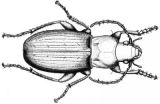(Press-News.org) LAWRENCE — A study from the University of Kansas finds that people can accurately detect the personality traits of strangers through Facebook activity; however, changes to the social media site in the past three years could be making it harder to do so.
Researchers sampled 100 Facebook users, paralleling the demographics of the social networking site, and asked them to fill out a personality survey. A group of coders looked at each person's Facebook activity, 53 cues in all, to see whether certain personality types were more likely to do specific activities. The researchers then had 35 strangers spend 10 to 15 minutes on each of the Facebook users' profile pages to see if they could correctly gauge a person's personality.
The crux of the study looked at which cues correlated to personality types and whether the 35 strangers were able to correctly detect personality traits based on those cues. The research found that extroversion was the easiest personality trait for strangers to interpret followed by agreeableness and openness. There was just one cue that pointed to conscientiousness and none that helped detect neuroticism.
The study, "Impression Management and Formation on Facebook: A Lens Model Approach," will be published this month in the journal New Media & Society. The research was conducted by Jeffrey Hall, an associate professor of communication studies, doctoral candidate Natalie Pennington and Allyn Lueders, who received her doctorate at KU and is now an assistant professor of communication studies at East Texas Baptist University.
While strangers were able to correctly match certain Facebook activities with personality traits, the researchers believe new algorithms enacted by Facebook could make it harder to detect personality traits.
"Studies have given us really good evidence that we do know what people are like when we get a complete view of their actions on Facebook," Hall said. "However, since much of that research studied earlier versions of Facebook, it's conceivable that people's ability to accurately judge others will go down as a consequence of these changes."
Since the data was collected in 2011, Facebook has changed how and when users see other people's activity. At the time data was collected, users saw every action – from likes to changes in personal history – their friends took. Now, those actions can be viewed in a small box in the upper right-hand corner of the page, making the actions less apparent.
Today, the posts on Facebook's most prominent feature, the newsfeed, are based on an algorithm that takes into account how recent the post is, how many people like it or have commented on it and if the user has frequently interacted with the person making the post.
That's an important shift for judging personalities because, according to the KU study, an agreeable person tends to post less often, an open person is less likely to respond to other people's posts but make more political status updates, and a conscientious person agrees more often with what other people post. So, if Facebook changes how often users see their friends' posts, users could be forming the wrong impressions of their friends.
"If Facebook suddenly starts highlighting people you may not have regularly interacted with and promotes a lot of posts from them, you may no longer think that person is agreeable," Pennington said. "It may not be that they post that much, but that your feed has gotten smaller and shows a smaller subset of friends."
Another change is the kind of information that was shown on the info page, now referred to as the About page. At one point, Facebook users were able to list their favorite bands, books and movies. Those who did so tended to have open personalities. Now Facebook asks users to choose from a list of options, which to Hall is a passive step versus an active one.
"An open person is able to construct their personality through the process of making choices. Facebook is essentially taking away agency and replacing it with algorithms," Hall said.
Some cues are still easy to spot, despite the changes made to Facebook. That is especially true for cues connected to extroverts, such as the total number of friends a Facebook user has, the number of friends in photos, status updates that are positive and the tendency to use extended letters in words, for example "nooooo" or "heeeeey."
One Facebook activity that didn't carry much weight in accurately detecting personality was the number of likes a post generates from other users.
"It is unfortunate because that it is one of the main factors in how often other people are seeing posts, and it is probably worthless for knowing what their real personality is," Hall said.
INFORMATION:
Facebook posts reveal personality traits, but recent changes could make it harder to do so
2014-09-11
ELSE PRESS RELEASES FROM THIS DATE:
Sometimes, adolescents just can't resist
2014-09-11
Don't get mad the next time you catch your teenager texting when he promised to be studying.
He simply may not be able to resist.
A University of Iowa study found teenagers are far more sensitive than adults to the immediate effect or reward of their behaviors. The findings may help explain, for example, why the initial rush of texting may be more enticing for adolescents than the long-term payoff of studying.
"The rewards have a strong, perceptional draw and are more enticing to the teenager," says Jatin Vaidya, a professor of psychiatry at the UI and corresponding ...
Satellite view of newborn Atlantic Tropical Depression 6
2014-09-11
The sixth tropical depression of the Atlantic Ocean Hurricane Season formed in the Eastern Atlantic Ocean and NOAA's GOES-East satellite captured it.
A visible image of Tropical Depression 6 was taken by NOAA's GOES-East satellite at 7:45 a.m. EDT on September 11 as it developed. The image was created by NASA/NOAA's GOES Project at the NASA Goddard Space Flight Center in Greenbelt, Maryland.
In addition to using GOES imagery and data from other NOAA and NASA satellites, The National Hurricane Center also uses measurements from the Advanced Scatterometer or ASCAT instrument ...
NJIT researchers working to safeguard the shoreline
2014-09-11
An NJIT research team has estimated the total mass of oil that reached the Gulf of Mexico shore in the wake of the BP Deepwater Horizon blowout. It's the first time such an estimate was reported, and the study is published in the August issue of Environmental Science and Technology.
The researchers found that 22,000 tons of oil reached the Gulf shoreline in 2010. This finding will help officials determine the persistence of oil on the shore and identify potential harm to the ecosystem.
The study was conducted by the Center for Natural Resources Development and Protection ...
Penn Medicine bioethicists call for greater first-world response to Ebola outbreak
2014-09-11
PHILADELPHIA – Amid recent discussion about the Ebola crisis in West Africa, Penn Medicine physicians say that high-income countries like the United States have an obligation to help those affected by the outbreak and to advance research to fight the deadly disease — including in the context of randomized clinical trials of new drugs to combat the virus. The two new editorials, which will appear "online first" in JAMA on September 11th, are written by faculty members in the Perelman School of Medicine at the University of Pennsylvania and the Department of Social Science, ...
Unusual host preference of a moth species could be useful for biological control
2014-09-11
A team of Iranian researchers from the Rice Research Institute of Iran have discovered that Gynnodomorpha permixtana, a well-known moth species from Europe and Asia, has changed its host preferences in order to adjust to Iran's northern region environmental conditions. The importance of this adaptation for biological control of problematic weeds in rice fields and the biology of the moth on new host plant have been described in the open access journal Nota Lepidopterologica.
The larvae of G. permixtana have been so far reported to feed on the seeds and flowers of plant ...
Ebola paper demonstrates disease transmission rate
2014-09-11
Sept. 11, 2014 - New research from Arizona State University and the University of Tokyo that analyzes transmission rates of Ebola in West African countries shows how rapidly the disease is spreading.
Researchers Gerardo Chowell-Puente, ASU School of Human Evolution and Social Change Associate Professor, and Hiroshi Nishiura of the University of Tokyo found that transmission rates for each single case of Ebola consistently showed at least one new case of the disease being transmitted. Country-specific analysis of transmission rates in Liberia and Sierra Leone showed on ...
Some male scientists willing to forsake careers for family
2014-09-11
One third of men in academic science are willing to scale back their careers to focus on family life, according to researchers.
While traditional fatherhood roles may be shifting, men in the male-dominated field of academic science, such as physics and biology, face significant challenges in trying to balance work and family life, said Sarah Damaske, assistant professor of labor and employment relations and sociology, Penn State. The majority of men studied spoke of the pull of fatherhood and a desire to spend more time with children, yet they also acknowledged that academic ...
Not enough vitamin B1 can cause brain damage
2014-09-11
MAYWOOD, Ill – (Sept. 11, 2014) A deficiency of a single vitamin, B1 (thiamine), can cause a potentially fatal brain disorder called Wernicke encephalopathy.
Symptoms can include confusion, hallucinations, coma, loss of muscle coordination and vision problems such as double vision and involuntary eye movements. Untreated, the condition can lead to irreversible brain damage and death, according to neurologists at Loyola University Medical Center.
In the developed world, Wernicke encephalopathy typically occurs in people who have disorders such as alcoholism and anorexia ...
Investigators from Montefiore and Einstein to present data at 2014 ASTRO Meeting
2014-09-11
NEW YORK (September 10, 2014) – Members of the Department of Radiation Oncology at Montefiore Einstein Center for Cancer Care (MECCC) and Albert Einstein College of Medicine of Yeshiva University's NCI–designated Albert Einstein Cancer Center will present new study findings at the 56th Annual Meeting of the American Society for Radiation Oncology (ASTRO) revealing the impact socioeconomic status has on radiation treatment compliance, predictive indicators for clinical outcomes and on radiation therapy duration and dosing recommendations. ASTRO is being held September 14 ...
Two new species of carabid beetles found in Ethiopia
2014-09-11
There are more than 150 species of beetles in the genus Calathus, 17 of which have only been found in the mountains of the Ethiopian Highlands. Now scientists have found two new ones — Calathus juan and Calathus carballalae — and have described them in Annals of the Entomological Society of America.
C. juan is named for Juan Novoa, the son of one of the authors, in recognition of his help on various beetle-collecting expeditions. Adults are black and shiny, and are 9.5-11.5 millimeters long. It was found under stones at the base of giant, tree-like plants called lobelias ...



